
|
I Have More Fun With You Than Anybody by Lige Clarke and Jack Nichols, St. Martin's Press, New York, 1972, 152 pages, hardcover $5.95
Acknowledgements mentioned at the beginning of the book included Dr. George Weinberg, who coined the word "homophobia," and John Francis Hunter (a.k.a. John Paul Hudson), author of The Gay Insider/USA. John Paul Hudson, the self-proclaimed Gay Insider, pays a tribute to Lige and Jack in his 1972 book, The Gay Insider/USA, which was a comprehensive guide to gay bars, baths, publications and organizations. He also included excerpts from book reviews of I Have More Fun With You Than Anybody, such as one by the The Advocate, which said, "Anyone familiar with the writings of Lige Clarke and Jack Nichols will probably expect more of their often outrageous wit and uninhibited observations ... This is not to say that this tome misses the mark. Far from it. Much of it is candid, lucid and provocative." Dr. George Weinberg's 1972 review said Lige and Jack are "not pleading a case but telling their adventures: as lovers, militants, sightseers, models for art classes, salesmen, yoga instructors. And their sexual adventures too, along with their opinions on fucking, cock sucking and numerous variants. They give their opinions on all these subjects in an even tone. The book lopes along easily, showing that marshlands for some people are meadows for others. Gay life, and for them, life together, have been a pleasure. Not perfect but successful." Chapter 33 of The Gay Insider/USA, which is titled "On Cock sucking," includes a reprint of Charles Shively's agitprop, "Cock sucking as an Act of Revolution," that was published in the first issue of Fag Rag. Shively asserted, among other things, "Everywhere the nuclear family is the model. Essential for those who cherish freedom must be to trash the nuclear family. Gay male liberation is at the heart of this revolution, and so conceived; every cock sucked is an act of LIBERATION... SUCK TO BE FREE!!!" Please excuse my digression, but notice that one of President Bush's stated goals is the "LIBERATION of Iraqis." Would cock sucking help him achieve this goal? Or does Bush fear that cock sucking is an Iraqi weapon of mass destruction? I suspect the latter because Bush supported the Texas sodomy laws that outlaw cock sucking and anal sex when he was the Governor of Texas. Chapter 34, which is titled "Lige and Jack," immediately follows Shively's "SUCK TO BE FREE" declaration. The Gay Insider says:
"Each week I would turn immediately to the column entitled 'Homosexual Citizen' by Lige and Jack, to read about the subject central to my life that has had so little airing. "I am looking now at the dust jacket of their book, I Have More Fun With You Than Anybody, showing them striding up a Manhattan street, healthy, athletic, smiling - and glowing. On the back they are caught in a more pensive mood, and you can study the fine contours of their faces. Jack is about ready to break into a grin, as always. His eyes register the range of his emotions, from momentary disappointment when all is not well to joy that everything is going just beautifully. Seldom do his eyes show despair. Even in the toughest situations, he seldom glowers, seldom seems to give up. He always has hope. The Gay Insider/USA, concludes, "Lige's bone structure is exotic, revealing a soupcon of wild Cherokee blood just as surely as Jack's says the moors of Scotland. Lige is a very old soul, into Oriental mysticism (as is Jack, but he seems, somehow, a convert rather than native). I see the mysteries of the Far East in his smile of recognition of all emotions as you talk to him. He knows everything, and I always feel I am expressing unnecessary angst, for instance, fully prepared to hear, 'Take time to breath.' Both are students of Yoga, both savor health foods, both ponder the wonders of today through the ancient teachings, prophets of the New Sensuality, front runners of The Movement." Today, when I look at my own, faded copy of I Have More Fun With You Than Anybody, I find the dust jacket to be historically interesting, given that it was designed and written by a mainstream publisher, the New York based, St. Martin's Press in 1972. Significantly, the front and back covers have no overtly gay references. Jack is shown wearing the then fashionable bell-bottoms and Lige is sporting a peace sign belt buckle.
Today, I am amused by the blurb's juxtaposition of the word "homosexual" with the idiom, "gaily, in every sense." This appears to be an echo of pre-1969 Stonewall speech patterns. I boldly asked my mother to buy the book for me, giving her the true, but incomplete line that it was about two peace-loving guys. I was grateful that she didn't open the book. Years later she couldn't recall buying the book but I suspect that her desire, as an English teacher, to have me reading books, overrode her protective instincts.
In fact, Minneapolis was a hot bed of gay activism. During my freshman year at the University of Minnesota in 1972, the openly gay Jack Baker was reelected student body president by using a very popular campaign poster that featured him in high heels (see attached picture). Jack Baker, as a law student, was the first person to notice that Minnesota marriage laws didn't specify gender. He actually succeeded in getting a marriage license issued, but it was revoked and unsuccessfully appealed to the U.S. Supreme Court. I joined Baker's FREE (Fight Repression of Erotic Expression) group and I watched its disintegration over Baker's single-minded focus on his gay marriage case. I frequented Sutton's bar in Minneapolis where I met Steve Endean, the bar's coat check clerk, who in 1978 moved to Washington, D.C. to become one of the first professional lobbyist for gay rights. It was at Sutton's where I was surprised to meet the closeted State Senator and university professor, Allan Spear, who would soon became one of the first openly gay politicians in the nation. I quickly discovered that gay people exist everywhere.
I was not impressed with the discussions of politics. But as an apathetic supporter of Vice President Hubert Humphrey's 1968 presidential campaign against Richard Nixon, I did enjoy reading about a campaign button that said, "Lick Dick ... Homosexuals for Humphrey." What impressed me when I first read this book was the fact that two men could openly love each other. This book liberated me (pardon the Bush-ism) from the idea that my life would be limited to tearooms and anonymous sex partners. But the book also made me realize that I didn't have to imitate traditional heterosexual marriages either. For example, I had highlighted on page 105 that "Lige lost his virginity to a woman long before he discovered men."
Thirty years ago, for the most part, I resonated with the personal experiences of Lige and Jack instead of their political thoughts. For example, Lige writes, "Adolescence wasn't all roses for Jack, however, He thought, as most gay adolescents, that he was 'the only one in the world.' It was a hellish experience, and in gym class, when he was thrown into the showers with dozens of naked boys, he worried about getting a hardon." I now know that most boys, both gay and straight, share this fear. At a first glance this book appears to be free of explicit sexual content, especially by today's standards. But a careful reading of it provided me with a gay sex education that would have taken me years to pick up on the street. As a naive 18 year old, who only knew about oral sex, reading Lige and Jack openly discuss oral and anal sex was a revelation. I was in awe when I read that some gay men enjoy being fucked in the ass. On page 30 Lige and Jack teased me by referencing, without any details, one of their "Homosexual Citizen" columns that was titled "Corn-holing is Christ-like." I would find it historically interesting to read this column. I hope that somebody will republish it. Unfortunately in 1972, I did not have the intellectual maturity to grasp many of the important ideas contained in this book. The book is not to blame for this. In other words, it took me a while to grow up and learn that there is more to gay life than sucking and fucking. In 1972 most gay college students' opinions were clearly influenced by gay liberation pioneers, such as Jack Nichols. Today's students are more likely to be influenced by the TV show Will & Grace or Andrew Sullivan's gay conservative polemics because the mainstream media rarely publishes the work of gay liberals, such as Richard Goldstein, author of The Attack Queers. As I've grown older and more conservative, I agree with many of Andrew Sullivan's ideas, but only if they were correctly implemented to preserve our freedom. The problem is that his work is being misused by mainstream publications as an excuse to smear queers and to say what straights want to hear, as Richard Goldstein eloquently points out Gay politics has shifted from being an argument between "gay liberationists" and "gay assimilationists" to being an argument between gay liberals and gay conservatives. The only difference today is that both liberal and conservative gays are silencing militant radical "gay separatists" and those who want to lower the age of consent, presumably for political gain. I Have More Fun With You Than Anybody was a radical political statement when it was published because, for the first time ever, a mainstream publisher allowed a gay male couple to be shown in a positive light. Somebody reading this book today could easily miss the political importance of this book and still enjoy it as a period-piece love story. This is why I predict that this book will be read by future generations, while all but serious historians will ignore books from this period that were only political. I used to travel the country searching for new and used gay books before the Internet and chain bookstores decimated independent bookstores. I discovered that the best books would rarely show up for sale, and when they became available they would sell quickly. Obviously, supply is a function of how many copies were printed, but a bigger reason, especially with gay books, is that people hoard good books. It is a tribute to I Have More Fun With You Than Anybody that during the twenty years after its publication, I rarely saw a used copy for sale. Don't bother to ask me. My copy is not for sale. |
|
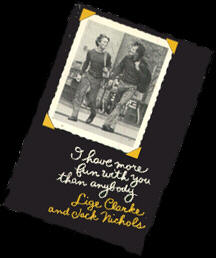 In celebration of Jack Nichols' 65th birthday on March 16,
2003, I recently reread his 1972 book, I Have More Fun
With You Than Anybody, which he coauthored with Lige
Clarke. Rereading it brought back many nostalgic memories.
In celebration of Jack Nichols' 65th birthday on March 16,
2003, I recently reread his 1972 book, I Have More Fun
With You Than Anybody, which he coauthored with Lige
Clarke. Rereading it brought back many nostalgic memories.
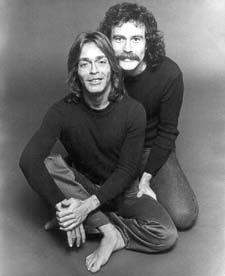 Jack Nichols and Lige Clarke, 1973
Jack Nichols and Lige Clarke, 1973  Lige Clarke
Lige Clarke 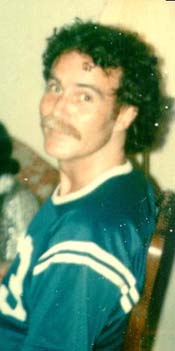 Jack Nichols in the 1970s
Jack Nichols in the 1970s 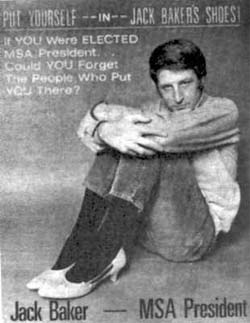 A campaign poster shows Jack Baker as the first openly-gay president of a
student body at the University of Minnesota (1972)
A campaign poster shows Jack Baker as the first openly-gay president of a
student body at the University of Minnesota (1972) 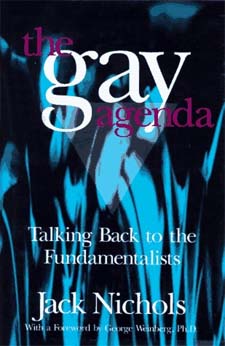 Jack Nichols' 1996 book, The Gay Agenda: Talking Back to the
Fundamentalists.
Jack Nichols' 1996 book, The Gay Agenda: Talking Back to the
Fundamentalists.